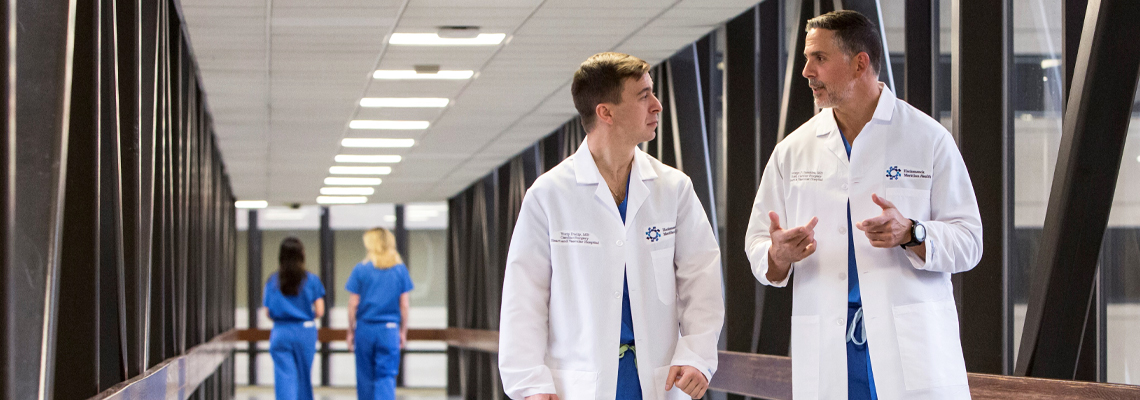
Bill McConnell was looking at his wife, Laura, when he died. Doctors and nurses rushed into the room, a flurry of activity, but Bill kept his focus on Laura’s face. He remembers thinking, “I hope this isn’t the last time I see you.”
That Bill is alive to tell the story is something of a miracle—a miracle made possible by leading-edge technology and a highly skilled team of cardiac experts.
“Without the right doctors and the right people to take care of you, maybe you don’t make it,” Bill says. “I was extremely fortunate.”
A Downward Spiral
Bill and Laura live in Beach Haven, New Jersey, a borough on the southern end of Long Beach Island. They enjoy living near the water and taking walks on the beach. Bill likes to bicycle and paddleboard.
In 2018, the 65-year-old was working as a contractor, just as he had done for the past 45 years. Suddenly, he didn’t feel well. He was bloated, had some pain, but thought it was probably nothing and would pass.
It didn’t. The pain worsened, and Bill wasn’t sleeping. “I never had chest pain in my life. Physically, I could do anything that I wanted,” he says. “This was the first time I felt that kind of pain.”
The pain eventually forced him to visit the Emergency Department at Southern Ocean Medical Center, where he was admitted. It was there Bill met interventional cardiologist James Orlando, M.D., who evaluated him and would guide him throughout his care. Tests showed a weak heart that was failing to pump adequately. Bill had a major coronary artery blockage and would need surgery, so he was seamlessly transferred to Jersey Shore University Medical Center for the procedure.
Bill’s condition quickly deteriorated. When Renato Apolito, M.D., an interventional cardiologist and medical director of the Jersey Shore Cardiac Catheterization Lab, saw him, Bill was experiencing ventricular tachycardia, a potentially fatal heart rhythm disorder. He was also in cardiogenic shock, which caused extremely low blood pressure.
Then Bill’s heart stopped working.
As Bill slipped away, Laura bravely put her full trust and faith into the doctors and nurses, who worked to bring him back. “Luckily, [the cardiac arrest] happened in front of our eyes,” Dr. Apolito says. “When it occurs in your presence, you can treat and correct the problem quite readily, before it becomes irreversible. You can stop a small fire before it becomes a wildfire.”
Led by Dr. Apolito, the team delivered electrical shocks to Bill’s heart to restore a normal rhythm. Bill was urgently taken to the cardiac catheterization laboratory, where Dr. Apolito implanted a left ventricular assist device called Impella®. The small pump essentially takes over for the heart, moving blood throughout the body.
Bill was stable, but the assist device was only a temporary measure. He would still need emergency surgery. “He was so sick, he really couldn’t wait to have surgery any longer,” Dr. Apolito says.
Kourosh Asgarian, D.O., a cardiothoracic surgeon, performed a coronary artery bypass graft surgery, completing two bypasses on the heart and repairing a leaky mitral valve.
Bill’s immediate recovery was not without complications, but he steadily improved. After about a month in the hospital, he went home. Dr. Orlando referred him to the cardiac rehabilitation program at Southern Ocean, and continued to see Bill for regular follow-up visits. In the rehabilitation program, Bill received guided exercise and nutrition education.
He completed a 12-week program that consisted of three 50-minute sessions per week. Each session included:
Guided exercise: A series of four 10-minute exercises, including walking on a treadmill, riding a stationary bike and weight training.
Medical monitoring: A nurse monitored his blood pressure, heart rate and other vital signs to keep him safe and track his progress.
Education: Sessions also included nutrition education and tips for maintaining heart-healthy habits.
“I couldn’t be happier with that program. They just did a fantastic job,” Bill says.
He supplemented his rehab with exercises of his own. He set up his rowing machine and bought a set of weights. He took walks outside when the weather was good and walked the length of his house, back and forth, when it wasn’t.
The miracle was complete. “We basically took a man whose heart had stopped, and now he’s home, working again, being productive,” Dr. Asgarian says.
The Beat Goes On
“Anyone who had anything to do with me did a phenomenal job. I could tell you a hundred stories,” Bill says. For example, how Dr. Asgarian visited him daily after the surgery to check his progress and bolster his spirits. “He came and saw me every morning. I’ll never forget that.”
Bill’s life—and the way he looks at it—was forever changed, but his priorities remain the same. If anything, the ordeal brought them into sharper focus.
“My family is my first priority,” he says. “We have two grandsons that came into our lives in the last two years, so that’s where my hopes and aspirations are: to be around and to see them grow up.”
Now that the weather’s nicer, he’d like to get back on the paddleboard. There’s a little island near his home that’s perfect for it. He’ll paddle out, glide along the water, feel the peacefulness of the surroundings and watch the birds. It will be beautiful, and he’s looking forward to it.
We all know the signs of a heart attack, right? Not necessarily. Tell-tale signs are not always present, and silent heart attacks account for 45 percent of all heart attacks. Learn the subtle signs of a heart attack and what you can do to spot one.
Learn more about cardiology and cardiac rehab at Hackensack Meridian Health.
Dr. Apolito is board certified in cardiovascular diseases, interventional cardiology and coronary CT angiography. To make an appointment, call 800-822-8905.
Dr. Asgarian is board certified in general surgery and thoracic surgery. To make an appointment, call 800-822-8905.
Dr. Orlando is board certified in cardiovascular disease. To make an appointment, call 800-822-8905.